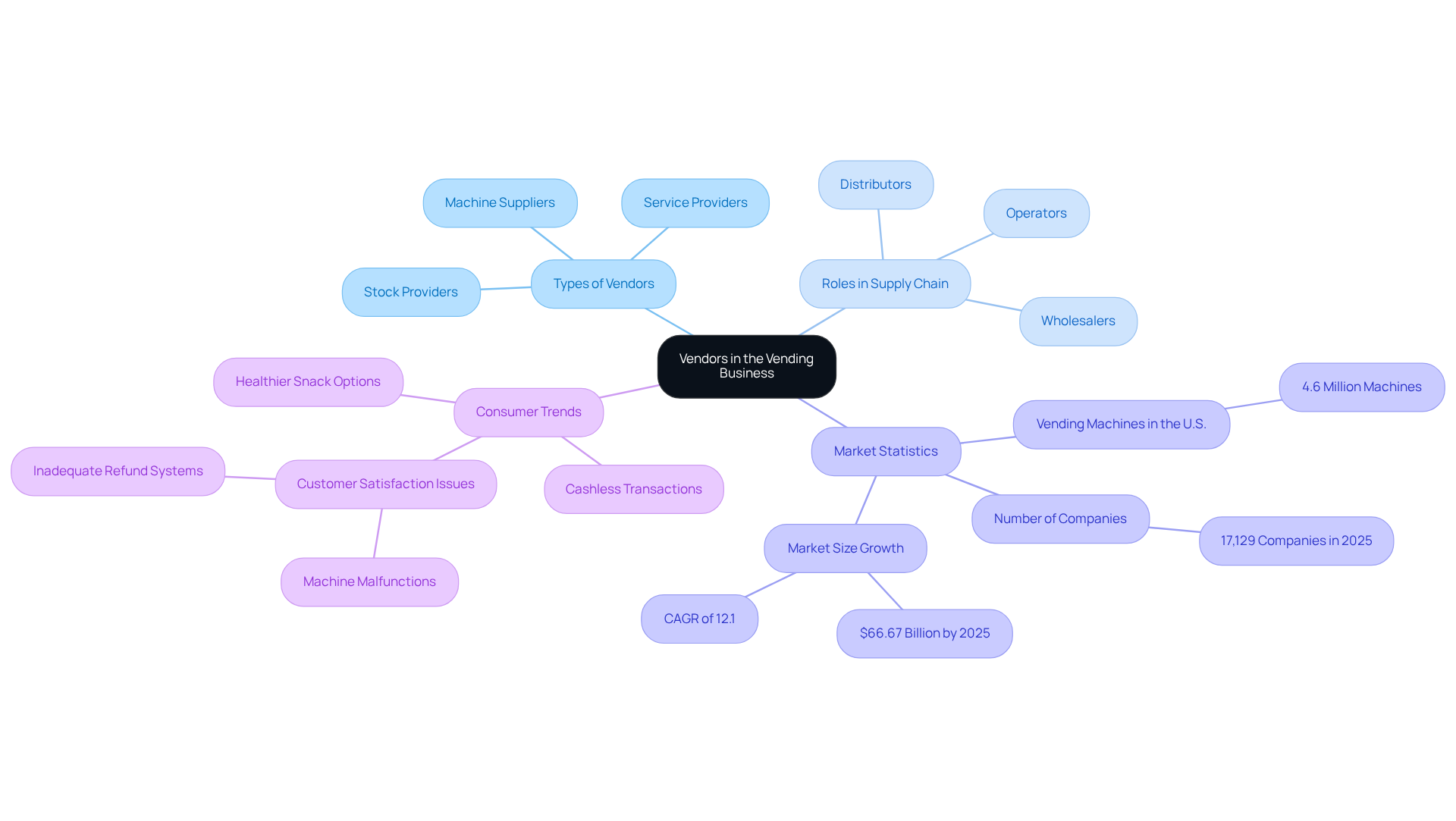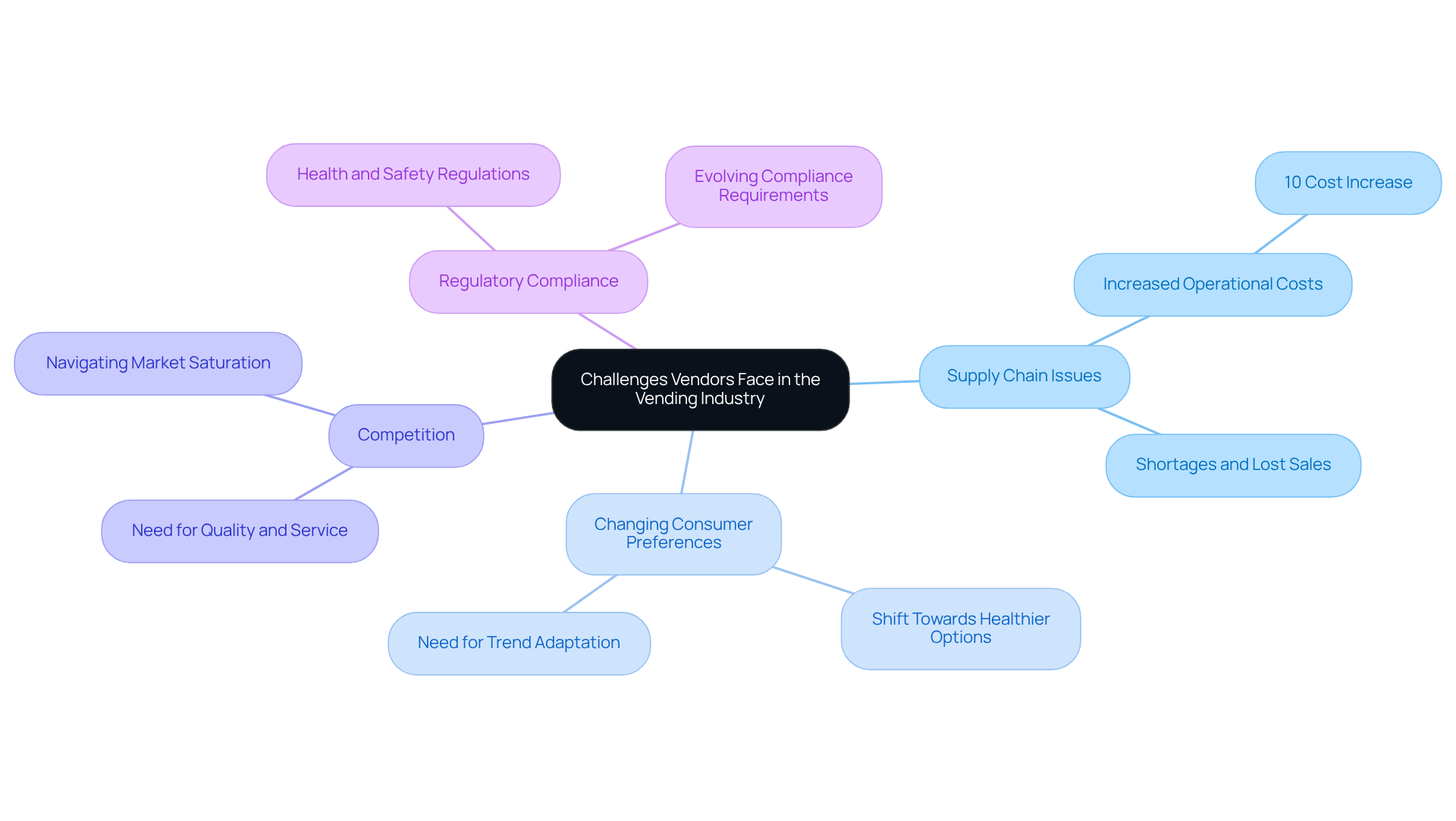Introduction
In the fast-paced world of vending, it’s not just about machines and snacks. Think about it: vendors are the backbone of any successful vending operation. They’re the ones who keep those machines stocked, well-maintained, and filled with the latest snacks that everyone loves.
As the industry grows—projected to hit a whopping $66.67 billion by 2025—it’s super important to understand how vending operators and their suppliers work together. What hurdles do these vendors face in such a competitive market? And how can their ability to adapt lead to success in a landscape that’s always changing?
Let’s break it down and explore these questions together.
Define Vendors in the Vending Business
In the snack machine world, venders are essentially anyone who supplies machines, snacks, or services to those managing the machines. This includes everything from the venders who make the vending machines to those who stock them with tasty treats and drinks. Suppliers are super important because they help operators keep everything running smoothly and ensure there's enough product to meet what customers want.
As of 2025, there are around 17,129 companies in the automatic merchandise machine sector in the U.S. This really shows how vital suppliers are in this market. They play a key role in the supply chain, including wholesalers, distributors, and service providers, all of whom help keep retail businesses humming along.
Successful operators often showcase their strengths through case studies that reveal how they adapt to market trends and what customers are looking for. For instance, sellers focusing on healthier snacks have really gained popularity as people shift towards better eating habits. This kind of adaptability not only improves the variety of products in vending machines but also supports the industry's overall growth, which is projected to hit a market size of $66.67 billion by 2025, growing at a solid compound annual growth rate (CAGR) of 12.1%.
Understanding how venders fit into the overall picture is crucial for machine managers. These venders are essential for maintaining stock levels, ensuring the machines operate effectively, and ultimately satisfying customer needs. The relationship between machine operators and their suppliers is key to building a successful sales operation that can meet the ever-changing market demands.

Explore the Role of Vendors in Vending Operations
You know how important it is to keep your snack machines running smoothly, right? Venders in the snack machine industry are key players in making that happen. They don't just provide machines that dispense snacks and drinks; they ensure you have reliable and efficient equipment at your fingertips.
But it’s not just about the machines. These venders also stock a variety of goods—think snacks, beverages, and more—that really hit the mark for your customers. Plus, many of them offer maintenance services, so you can rest easy knowing your machines are always in top shape and well-stocked.
Having solid connections with your suppliers can make a world of difference. It helps you manage your inventory better, cuts down on downtime, and keeps your customers happy with a diverse product range. Just listen to what one user said: "Vending Village has seriously transformed our business. We're way more productive and seeing great results."
By building these relationships, you can really boost your business performance. To thrive in a competitive market, a strong network of quality venders is essential. And here’s the good news: Vending Village has a seller verification process that adds a layer of trust and security in the marketplace community. That’s just one more reason to value these partnerships!
Identify Key Characteristics of Successful Vendors
You know, successful sellers in the merchandise industry often share a few key traits. They’re reliable, offer quality goods, and provide excellent customer service. Think about it: a trustworthy supplier is someone who delivers products on time and keeps communication open with venders. That kind of transparency is crucial for building trust among the venders in the Vending Village community.
Now, quality is a big deal. Suppliers need to deliver products that not only meet consumer expectations but also comply with health and safety regulations. It’s all about keeping your customers safe and satisfied.
But here’s the thing: successful sellers are also flexible. They can adapt to changing market needs and shifting consumer preferences. That’s where Vending Village comes in. Their commitment to customer support means sellers have the right tools and resources to thrive. Plus, user testimonials really showcase the transformative impact of their services.
So, if you’re looking to boost your business performance, consider establishing a strong partnership with venders who embody these qualities. It can make a world of difference for your vending operation!
Examine Challenges Vendors Encounter in the Market
Venders in the vending industry encounter significant challenges that can greatly affect their operations and relationships with vending operators. One major concern? Keeping a steady supply chain. When disruptions happen, it can lead to shortages, which means lost sales and unhappy customers. For instance, recent stats show that supply chain issues have caused a 10% increase in operational costs for many suppliers. That’s a lot of financial pressure!
Now, let’s talk about changing consumer preferences. As health awareness grows, more businesses are shifting towards healthier options. This means suppliers need to adapt their products. It’s a double-edged sword: there’s a chance to meet new demand, but it also means staying ahead of trends to stay competitive.
And don’t forget about competition! Many suppliers are vying for the attention of vending operators. To stand out, sellers have to offer top-notch quality and exceptional service. But that’s not all; they also have to navigate the tricky waters of health and safety regulations. Staying informed and flexible with these evolving rules is crucial.
So, here’s the takeaway: the mix of supply chain issues, changing consumer demands, fierce competition, and regulatory compliance creates a complex landscape for venders. It’s all about strategic planning and being agile to thrive in this market. What steps are you taking to adapt?

Conclusion
Venders are super important in the vending industry. They really are the backbone that keeps everything running smoothly. Not only do they supply the machines and products, but they also bridge the gap between operators and the ever-changing market demands. This connection is key to making sure vending machines are stocked with options that customers actually want, which in turn drives business growth.
So, let’s think about it. The vending market is projected to hit a whopping $66.67 billion by 2025. That’s huge! This growth really highlights how essential it is to have reliable suppliers who can keep up with consumer trends, like the increasing demand for healthier snacks. The best venders are those who are reliable, offer quality service, and can adapt quickly. These traits are crucial for handling challenges like supply chain hiccups and shifting regulations.
Here’s the thing: building strong partnerships with effective venders is vital if you want your vending operation to thrive in this competitive landscape. By focusing on these relationships and being flexible to market changes, you can really boost your business performance and set yourself up for long-term success. Remember, valuing venders not only helps your own business but also supports the overall growth and health of the vending industry.
Frequently Asked Questions
Who are considered vendors in the vending business?
Vendors in the vending business are anyone who supplies machines, snacks, or services to those managing vending machines. This includes manufacturers of vending machines, suppliers of snacks and drinks, and service providers.
Why are suppliers important in the vending industry?
Suppliers are crucial because they help operators keep vending machines running smoothly and ensure there is enough product to meet customer demand.
How many companies are involved in the automatic merchandise machine sector in the U.S. as of 2025?
As of 2025, there are around 17,129 companies in the automatic merchandise machine sector in the U.S.
What role do vendors play in the supply chain of vending machines?
Vendors play a key role in the supply chain by acting as wholesalers, distributors, and service providers, all of which help maintain the operation of retail businesses.
How have successful vending operators adapted to market trends?
Successful operators often showcase their strengths through case studies that reveal their adaptability to market trends, such as focusing on healthier snack options to meet changing consumer preferences.
What is the projected market size of the vending industry by 2025?
The vending industry is projected to reach a market size of $66.67 billion by 2025, with a compound annual growth rate (CAGR) of 12.1%.
Why is understanding the relationship between machine operators and suppliers important?
Understanding the relationship between machine operators and suppliers is crucial for maintaining stock levels, ensuring effective machine operation, and satisfying customer needs, which contributes to building a successful sales operation.
List of Sources
- Define Vendors in the Vending Business
- Vending Machine Operators in the US Industry Analysis, 2025 (https://ibisworld.com/united-states/industry/vending-machine-operators/1113)
- marketresearch.com (https://marketresearch.com/Kentley-Insights-v4035/Vending-Machine-Operators-Research-Updated-41393525)
- The United States Retail Vending Machine Market Size & Outlook, 2033 (https://grandviewresearch.com/horizon/outlook/retail-vending-machine-market/united-states)
- thebusinessresearchcompany.com (https://thebusinessresearchcompany.com/report/vending-machine-operators-global-market-report)
- Vending Machine Statistics and Facts (2025) (https://news.market.us/vending-machine-statistics)
- Explore the Role of Vendors in Vending Operations
- fastercapital.com (https://fastercapital.com/keyword/vendor-quotes.html/1)
- 360connect.com (https://360connect.com/vending-machine-service/price-quotes)
- nauticalcommerce.com (https://nauticalcommerce.com/blog/vendor-management-best-practices)
- componentcontrol.com (https://componentcontrol.com/products/modules/vendor-quotes)
- Identify Key Characteristics of Successful Vendors
- Vending Machine Statistics in 2023 - Vending Locator (https://vendinglocator.com/blog/vending-machine-statistics)
- businessplan-templates.com (https://businessplan-templates.com/blogs/metrics/vending-machine)
- bottomsupvend.com (https://bottomsupvend.com/7-things-to-look-for-in-reliable-vending-machine-services)
- dfyvending.com (https://dfyvending.com/reliable-vending-machine-supplier)
- How to Choose the Right Vending Machine Supplier | Feel Good Snacks Canada (https://feelgoodsnacks.ca/post/how-to-choose-the-right-vending-machine-supplier)
- Examine Challenges Vendors Encounter in the Market
- dfyvending.com (https://dfyvending.com/challenges-running-vending-business)
- linkitsoft.com (https://linkitsoft.com/the-top-problems-of-buying-vending-machine-business)
- Vending Machine Operators in the US Industry Analysis, 2025 (https://ibisworld.com/united-states/industry/vending-machine-operators/1113)
- fastercapital.com (https://fastercapital.com/topics/overcoming-challenges-in-street-vending.html)




